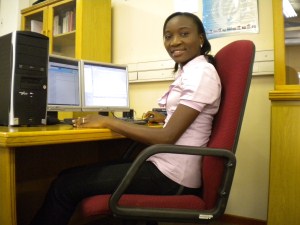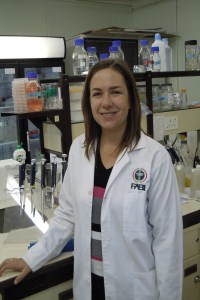Posted on July 23, 2012
Prof Stephanie Burton, the Vice-Principal for Research and Postgraduate Education at the University of Pretoria, lauded the two students for their achievements:
“The University of Pretoria is immensely proud to have two award-winners among the 2012 L’Oreal-UNESCO Women in Science award recipients from Sub-Saharan Africa. Their achievement demonstrates not only the excellence and relevance of their own research, but also the increasing impact on the generation of knowledge being made by women. We congratulate Oluwasola Mary Fasan and Gerda Fourie whole-heartedly and we would like to thank them for their contribution to the University’s research endeavours and as role models for women researchers in our region”.
The L’Oréal-UNESCO Regional Fellowships for Women in Science in Sub-Saharan Africa is open to all women scientists up to age 40 across Sub-Saharan Africa who are working towards their PhD in all fields of science. The fellowship programme aims to increase representation of women in global scientific circles, thereby creating role models for future female generations.
Bertrand de Laleu, L’Oréal South Africa Managing Director, says the programme was born out of the need to help women scientists overcome one of the most common obstacles they face in pursuing their careers: money. “The idea behind these fellowships is that one of those stumbling blocks – access to finance – is removed, so these women may reach their full potential as scientists,” he says.
L’Oréal-UNESCO Regional Fellowships for Women in Science in Sub-Saharan Africa fellows
Oluwasola Mary Fasan
Nigerian-born Oluwasola Mary Fasan was raised in a family that included three lively brothers, aside from her parents and sister. As a child she preferred participating in various activities with her brothers, including the types of chores normally relegated to the men of the household – rather than the traditionally women-oriented realms of housekeeping and related domestic duties.
Oluwasola further defied traditional gender roles by developing a love for mathematics, another area customarily dominated by men. From an early age she firmly set her sights on a career involving mathematics and its applications.
She completed her first degree in Mathematical Sciences at the Federal University of Agriculture in Nigeria in 2006, followed by a lectureship at the Hussaini Adamu Federal Polytechnic as part of her national youth service – a mandatory requirement for all Nigerian graduates. Shortly thereafter Oluwasola was awarded a scholarship to study at the African Institute for Mathematical Sciences (AIMS) in Cape Town, where she went on to complete a postgraduate diploma degree in Mathematical Sciences at the University of Cape Town in 2008.
Oluwasola completed her Masters in Computer Science at the University of Stellenbosch in 2010 before working as a teaching assistant at the African Institute for Mathematical Science for a year. In August 2011 she started her PhD under the supervision of Professor Martin Olivier of the Computer and Information Security Research Group at the Department of Computer Science, University of Pretoria.
Oluwasola's research focuses on the reconstruction of information in database forensics. She explains how “the use of database systems in storing critical and sensitive information in many organisations has led to an increased number of attacks on databases, leading to a stronger interest in obtaining evidence from databases. Database forensics is a branch of digital forensics that deals with the identification, preservation, analysis and presentation of evidence from databases.
“My research investigates various ways of regenerating information in a database from an earlier time prior to an attack, damage, deletion or other modifications, particularly for investigative purposes.”
She hopes her research will lead to the development of algorithms for the reconstruction of information previously stored in a database to successfully aid investigations. “This will enhance security in computer systems by providing an effective way of investigating crimes involving the manipulation of a database and regenerating the information from an earlier time, in order to hold perpetrators accountable,” she adds. “The research will also make a major contribution to the computer security and digital forensics fields, which will hopefully lead to a reduction in computer crime.”
Gerda Fourie
Although she grew up in Mokopane, Limpopo Province, Gerda Fourie has lived in Pretoria, Gauteng Province, for the past 15 years – where she attained both her BSc in Microbiology and Plant Pathology, and her Honours in Microbiology at the University of Pretoria.
Following the completion of her Honours, Gerda accepted a post as a food microbiologist at Food Consulting Services in Midrand. The following year she worked as a research assistant at The Forestry and Agricultural Biotechnology Institute (FABI) at the University of Pretoria.
In 2004 she enrolled for an MSc degree in Microbiology (part time) at the University of Pretoria, obtaining her degree cum laude in 2008. She went on to publish two research papers based on her thesis, and in 2009 she received the FABI award for best student publication. That same year she enrolled for a PhD degree in Microbiology at the University, and was awarded an NRF Scarce Skills Bursary to help her complete her studies.
“I have always been passionate about science and biology, and I enjoy the challenges and constantly changing environment of research. My research interests include the biology and evolution of Fusarium oxysporum and related fungi species in the Gibberella fujikuroi species complex, with specific focus on F. circinatum, the causal agent of pitch canker in pines,” says Gerda.
Her current research is entitled ‘The evolution of mitochondrial genomes within the Gibberella fujikuroi species complex’. The Gibberella fujikuroi species complex (GFC) includes many economically important pathogens. Species in this complex are the focus of various ongoing genome sequencing projects that seek to better understand the genetics and biology of these fungi.
Gerda has presented her research at four international and three national conferences, and has authored or co-authored six ISI-rated publications (and has an h-index of 3). Apart from working towards obtaining her PhD, Gerda is involved in mentoring undergraduate students linked to the CTHB / Faculty of Natural and Agricultural Sciences, as well as postgraduate BSc (Honours) and MSc students.

Oluwasola Mary Fasan

Gerda Fourie
Copyright © University of Pretoria 2025. All rights reserved.
Get Social With Us
Download the UP Mobile App